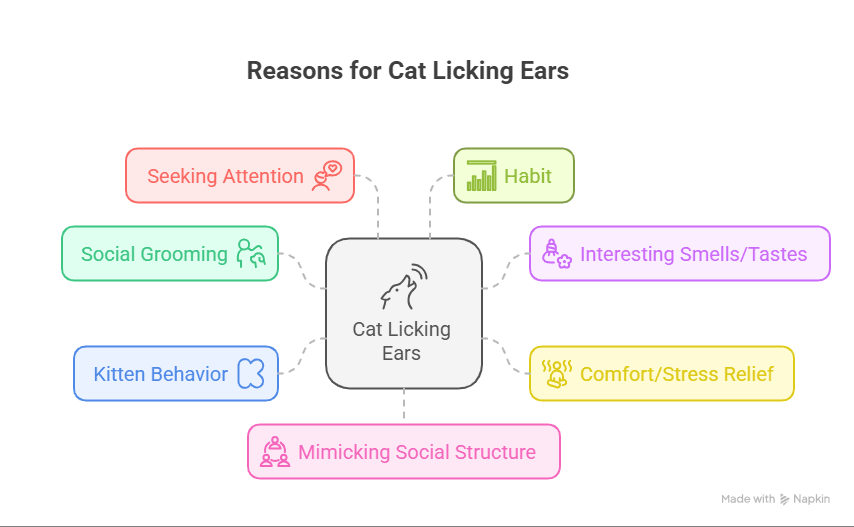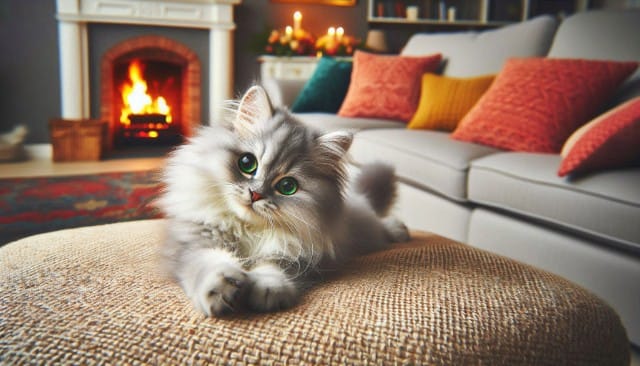
Introduction
You’re enjoying a peaceful moment on the couch or drifting off to sleep when suddenly, you feel a rough little tongue on your ear. Your cat has decided it’s grooming time, and your ear is the target.
It’s warm, a little wet, kind of ticklish, and—let’s be honest—downright weird.
So naturally, you ask yourself:
“Why does my cat lick my ear?”
Is it a sign of love? Grooming? Is your cat telling you something? Or are you unknowingly walking around with earwax that smells like tuna?
Surprisingly, this behavior is not only common—it’s often a sign of affection, trust, and instinctual bonding. But it can also stem from stress, habit, or a desire for attention.
Let’s explore the fascinating reasons why your cat might be giving your ears a wash, when to be concerned, and how to respond (if you’d prefer to keep your ears to yourself).
Is It Normal for Cats to Lick Human Ears?
Yes—it’s completely normal feline behavior, though not all cats do it.
Cats may lick:
- Ears
- Hair
- Eyebrows
- Fingers
- Even armpits (yes, it happens)
These odd little acts are extensions of their natural grooming behaviors and are often triggered by emotional bonding, curiosity, or instinct.
Cats that were raised in litters or closely socialized with humans tend to exhibit more grooming-based behaviors toward their people. So, if your cat’s giving you an ear bath, it likely sees you as part of the family.
Why Does My Cat Lick My Ear? 7 Common Reasons

Let’s break down the top reasons behind this peculiar (and sometimes wet) feline habit:
😽 1. Social Grooming (Allogrooming): You’re Part of Their Family
One of the primary reasons your cat licks your ear is to groom you, yes, like another cat.
In the feline world, this is known as allogrooming, and it plays a key role in:
- Bonding between cats
- Building trust
- Establishing social hierarchy
- Comforting each other
Kittens are groomed by their mothers from birth. As they grow, they begin grooming their siblings and trusted companions. If your cat starts licking your ear, it’s showing you that:
- You’re part of its social group
- It wants to strengthen your bond
- It’s offering affection in a cat-approved way
In short: your cat loves you—and this is how they show it.
👃 2. Your Ear Smells or Tastes Interesting
Let’s face it: ears are kind of gross (even if you’re a clean person). They produce natural oils, sweat, and wax, which to a cat, might smell… intriguing.
Cats have a sense of smell 14 times stronger than humans. Your ears might be giving off:
- Salty skin residue (from sweat)
- Natural oils or sebum
- The scent of your shampoo, pillow, or bedding
- A subtle hormonal signature
This doesn’t mean you’re unclean—it just means your cat is detecting unique scents it wants to explore. Combine that with their rough, sandpaper tongue, and voilà—ear licking.
🧠 3. Licking for Comfort or Stress Relief
For many cats, licking is not just a grooming behavior—it’s also a calming ritual.
Much like humans chew gum, pace, or fidget when nervous, cats may:
- Lick themselves
- Lick fabric or objects
- Lick you—including your ear
If your cat licks your ear while purring, kneading, or right before sleep, it may be self-soothing. The rhythmic motion and your scent both contribute to a sense of safety and relaxation.
This is particularly common in:
- Rescue cats
- Cats prone to separation anxiety
- Cats with high emotional sensitivity
🧒 4. Kitten Behavior and Oral Fixation
Some cats that were weaned too early develop what’s known as oral fixation—a tendency to suckle, lick, or chew as a substitute for nursing.
These cats may lick:
- Blankets
- Their tails
- Fabric
- Your fingers or ears
It’s a form of comfort-seeking behavior that mimics the emotional security of nursing.
If your cat tends to:
- Lick your ear while kneading
- Nibble gently like suckling
- Seek close physical contact during licking
…then it’s likely carrying over kitten-like habits into adulthood. It’s not harmful, but it may become persistent.
🎯 5. They’re Seeking Attention
Let’s be honest—licking your ear gets a reaction.
You might:
- Laugh
- Talk to them
- Pet them
- Move or shift around
To a clever cat, this is a cause-and-effect jackpot.
If your cat learns that ear-licking leads to:
- Attention
- Cuddles
- Playtime
- Feeding…
…they may repeat the behavior on purpose. Especially if you’re otherwise distracted (scrolling, watching TV, or trying to nap).
Ear licking becomes a trained behavior, not unlike pawing at your face or sitting on your keyboard.
🕒 6. It’s a Habit (That’s Hard to Break)
Cats are creatures of habit. If your cat has been licking your ear since kittenhood or for years, it may now be:
- A daily routine
- A nighttime or morning ritual
- Linked to specific triggers (your position, mood, scent, etc.)
Habits in cats form quickly and are reinforced by repetition. If you’ve ever smiled, giggled, or pet your cat after an ear-licking session, you may have unknowingly rewarded the behavior.
🧬 7. They’re Mimicking Feline Social Structure
Cats in colonies have a subtle social system. Grooming plays a big role in:
- Establishing relationships
- Showing submission or dominance
- Maintaining group bonds
When your cat licks your ear, they may be:
- Submissively bonding
- Trying to “care for” you
- Reinforcing your status as their trusted companion
So while it feels a little strange, it’s also incredibly sweet.
Is It Safe to Let My Cat Lick My Ear?
In most cases, yes—it’s harmless.
But there are a few things to keep in mind:
✅ Safe If:
- Your cat is healthy and up-to-date on vaccinations
- You don’t have open wounds, piercings, or skin conditions
- It’s occasional and non-aggressive
⚠️ Use Caution If:
- Your cat licks obsessively or aggressively
- You’re immunocompromised or prone to infections
- You’ve recently had ear surgery, eczema, or piercings
- Your cat shows signs of stress (tail twitching, sudden biting)
Cat tongues carry bacteria, just like human mouths. While most cases are harmless, it’s best to avoid licking if you:
- Have sensitive skin
- Dislike the feeling
- Notice any irritation afterward
When to Be Concerned About Excessive Licking
While ear-licking is typically sweet and affectionate, it can sometimes cross into problematic behavior.
Here are signs that your cat’s licking might be compulsive or stress-related:
🚩 Red Flags:
- Licking turns to nibbling or biting
- Your cat licks for long periods, even when not encouraged
- They seem agitated during or after licking
- Licking is accompanied by hiding, vocalizing, or pacing
If the licking seems obsessive or tied to anxiety, boredom, or health changes, consult your vet or a feline behaviorist. Compulsive grooming can be a sign of underlying emotional or neurological issues.
How to Gently Redirect the Behavior (If You’d Like It to Stop)
You love your cat, but maybe not when their tongue is in your ear. Here’s how to discourage the behavior without hurting your bond.
✅ 1. Don’t Punish—Redirect
Punishing licking with yelling, scolding, or physically pushing them away can damage trust. Instead:
- Calmly shift their attention to a toy or treat
- Offer soft petting or brushing as a substitute
- Move them gently to a cozy blanket or perch
✅ 2. Reinforce Alternative Behavior
When they engage in non-licking bonding behaviors (like cuddling or sitting beside you), reward with:
- Praise
- Treats
- Extra petting
✅ 3. Create a Comfort Object
If the licking is due to anxiety or oral fixation, try:
- A soft blanket or plush toy
- A heated bed for comfort
- Enrichment toys or puzzle feeders to distract
✅ 4. Adjust Routines
Cats often lick at night or in the morning. To disrupt the habit:
- Change sleeping arrangements if needed
- Avoid encouraging licking during sleepy cuddle sessions
- Try playing with them before bedtime to burn excess energy
FAQs
Why does my cat lick my ear and then bite it?
This is often a sign of overstimulation. Cats may start grooming, then suddenly nip when they’ve had enough. Watch their body language and redirect before it escalates.
Why does my cat lick my ear only when I’m sleeping?
Your cat may feel most relaxed or affectionate during your rest. It may also be seeking attention or reacting to the stillness and warmth of your sleeping posture.
Is it okay if my kitten licks my ear every day?
Generally, yes—but monitor for obsessive behavior. If it’s excessive or disrupts sleep, gently redirect with toys, affection, or a cozy alternative.
Also Read - Why Do Cats Sleep at the Foot of the Bed? The Surprising Truth Behind Your Cat’s Favorite Spot
Conclusion
So, why does your cat lick your ear?
Because they love you. Because they trust you. Because you taste kind of salty. And because, in their quirky, feline way, they’re trying to care for you just like they would a fellow cat.
While it may feel odd to you, it’s a deeply instinctual and affectionate behavior. It means you’ve earned their trust and made it into their inner circle.
That said, if the wet licks are a bit much, it’s okay to gently guide them elsewhere. Just know: behind every unexpected ear-lick is a cat saying…
“You’re mine. And I love you.”




